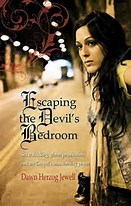
ESCAPING THE DEVIL’S BEDROOM
Escaping the Devil’s Bedroom
Dawn Herzog Jewell Monarch Books
ISBN 978 1 85424 817 6
The writer of this informative account of investigating, interviewing and saving victims of the sex trade, has an MA in Missions and Intercultural Studies and she has made this book eminently readable. At the end of each chapter she alludes to passages in the bible, where the reader can glean parallel stories, pertaining to outreach work for example. She asks us to pray to God and for the staff and volunteers at Faith House, the Cleft and Samaritana to be effective witnesses of God’s love when transforming the lives of those in vice.
The saddest part of the book is coverage of child sex tourism, a major problem. Around 2 million children are prostituted in Asia, Latin America and Africa. Predators travel for “sex tours”. Dawn’s estimate is Americans account for 25 per cent of them; the average victim being 14 years old. To combat this, World Vision have worked with national governments, US immigration and law enforcement agencies, threatening 30 years’ imprisonment for engaging in sexual activity with children under 18, even if outside the US. The problem remains massive with a figure in Thailand alone of 20-30,000 children involved in its sex industry. World Vision is sponsoring a campaign to put sex tourists off, using airport billboards and posters, advertisements in tourist magazines, and brochures in taxis and hotels in Costa Rica, Thailand, Cambodia, Mexico and the United States.
In Nigeria, women are frequent trafficking victims. Grace visited a voo doo priest and went through a ritual which was designed to scare her as she entered into prostitution. The second time she returned to the same “ju ju” priest, she was forced to have sex with him whilst others watched. Women from countries like this may be duped into answering bogus advertisements for jobs in secretarial or modelling work before being drawn into prostitution.
Mark Wakeling, Director of the National Christian Alliance on Prostitution in the UK recognises that options are severely limited for people in prostitution, and he also addresses Jesus’ position that he did not withdraw from these people who desperately need compassion.
Sexualisation of girls in the media does not help the safety and self image of young people. Dawn refers to popular music lyrics which degrade women, such as, “So blow me bitch, I don’t rock for cancer/I rock for the cash and the topless dancers” (Kid Rock 1998).
At the end of this informative and compassionate book is a comprehensive glossary which includes details of websites, interviews with people in the vice trade, helping organisation such as “Red Light Rescue” and plenty of other information relating to the book’s contents.
Considering the seriousness of what is contained in this account, Dawn Herzog Jewel needs to be congratulated on her sympathetic, and caring handling of the material. The accounts of people who have been helped to a new and more meaningful life provide evidence that organisations which go on outreach missions to rescue and pray for and with victims of the vice trade can make a world of difference.
PENNY NAIR PRICE
